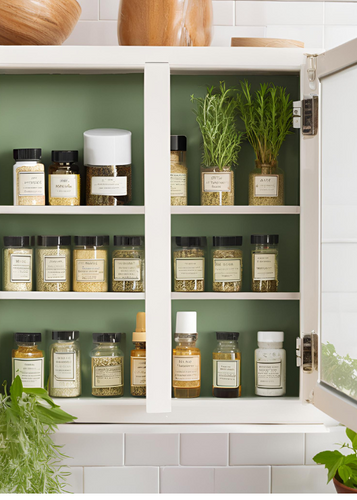Essential Herbs: Always Keep These Herbal Remedies in Your Home
Jul 26th 2024
Key Herbs for Home: Ensure These 12 Essential Herbs Are Ready for Quick Home Remedies.
Harnessing nature for health involves understanding the intricate balance of herbal remedies and their potential benefits. For instance, herbs like turmeric and ginger are prized for their anti-inflammatory properties, beneficial in managing conditions like arthritis and digestive discomfort. Others, such as rhodiola and milk thistle, offer stress relief and support liver function respectively, contributing to overall vitality and resilience. Embracing herbal remedies not only empowers individuals to take charge of their health naturally but also encourages a deeper connection with the natural world and its healing capabilities.
Antibiotic and Antimicrobial:
Garlic (Allium sativum) Garlic acts as a natural antibacterial agent, supports heart health, and fights infections. Benefit from its properties raw or through aged garlic extracts. Cautious of potential interactions with medications.
Cardiovascular Health:
Dan Shen, or Salvia miltiorrhiza, is a cornerstone of Traditional Chinese Medicine (TCM), celebrated for its cardiovascular benefits. It enhances blood circulation, reduces heart attack risk, lowers blood pressure, and alleviates chest pain. The most common way to use Dan Shen is through herbal teas or tinctures.
Anti-inflammatory:
Hu Zhang (Polygonum cuspidatum) Hu Zhang's anti-inflammatory properties, attributed to resveratrol, support joint health. It can be used in salves, capsules, or teas to benefit from its therapeutic effects. Be mindful of interactions with specific medications.
Turmeric (Curcuma longa) Known for its anti-inflammatory benefits, Turmeric alleviates joint pain.
Enhance its absorption with black pepper or healthy fats by incorporating it into dishes or golden milk.
Liver Health and Detoxification:
Milk Thistle (Silybum marianum): Supports liver function and aids in detoxification processes.
Digestive Health:
Ge Gen (Pueraria lobata) Ge Gen aids digestive health and eases menopausal symptoms.
Boil its roots for herbal teas or decoctions to benefit from its therapeutic properties. Ensure you follow recommended dosages to avoid potential side effects.
Ginger (Zingiber officinale) Ginger aids digestion, relieves nausea, and has versatile culinary and medicinal uses. Enjoy it raw, as tea, or in poultices. Pregnant women should use it in moderation and consult healthcare providers.
Pain Relief (Analgesic):
Yan Huo Su (Rhizoma corydalis yanhusuo) Known for its analgesic properties, Yan Huo Su effectively alleviates various types of pain. It is often used in herbal oils or poultices. Caution is advised due to potential interactions with blood-thinning medications.
Stress Relief and Adaptogenic:
Rhodiola (Rhodiola rosea) Rhodiola, an adaptogenic herb, reduces stress and enhances energy. Incorporate it into your routine through teas, tinctures, or capsules. Monitor for potential interactions, especially with antidepressant medications.
Immune Boosting:
Cat's Claw (Uncaria tomentosa) Enhancing immune function, Cat's Claw fights infections but may overstimulate the immune system in autoimmune conditions. It is commonly prepared as a tea or in capsule form under healthcare guidance.
Antimalarial and Antiviral:
Qing Hao (Artemisia annua) With potent antimalarial properties, Qing Hao effectively treats malaria. Brew its leaves for infusions or opt for extracts, ensuring careful dosage due to its strength.
Antioxidant:
Gou Teng (Uncaria rhynchophylla) Gou Teng has been used in TCM for centuries to manage headaches and hypertension, calming the nervous system effectively. It is commonly enjoyed as a herbal tea or tincture.
Avoid use during pregnancy and consult a healthcare provider if you have hypertension.
Each of these herbs offers unique health benefits and can be used as part of a holistic approach to wellness. Incorporating them into your daily routine can support various bodily functions and promote overall health and vitality.
Medicinal herbs have played a pivotal role in holistic health practices for centuries, offering a wide array of benefits that complement modern medical approaches. As awareness grows, more individuals are turning to these natural remedies to address common ailments such as colds, fevers, and digestive issues.
Embark on a journey of natural health with these essential medicinal herbs. Whether growing them in a home garden or incorporating them into daily rituals, these remedies offer potent benefits alongside conventional medical care.
Tips for Integrating Herbal Remedies:
- Cultivate a Herb Garden: Ensure a fresh supply of medicinal plants.
- Balanced Lifestyle: Combine herbal remedies with a holistic approach to well-being.
- Consultation: Always seek professional advice before starting new herbal treatments to ensure safety and efficacy.
Harness the power of nature with these herbal remedies while maintaining a proactive approach to health and wellness.


